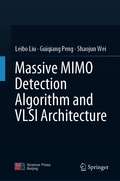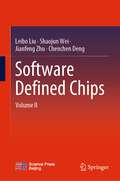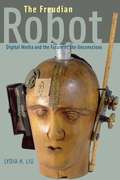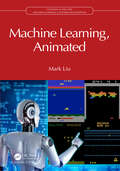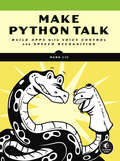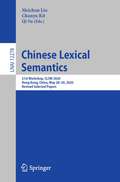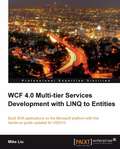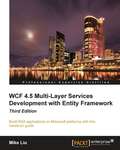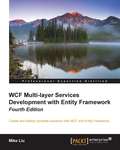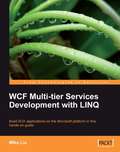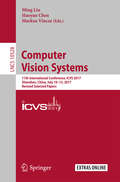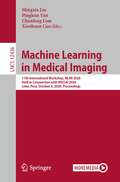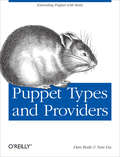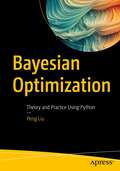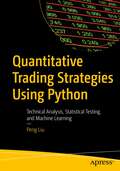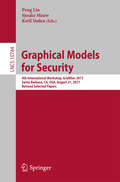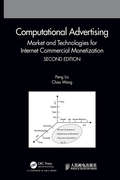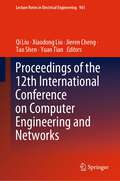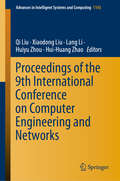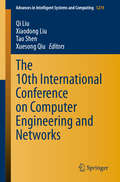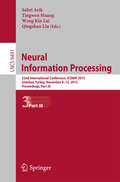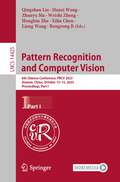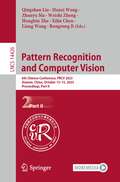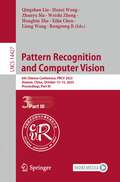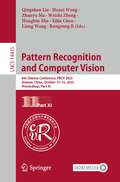- Table View
- List View
Massive MIMO Detection Algorithm and VLSI Architecture
by Leibo Liu Shaojun Wei Guiqiang PengThis book introduces readers to a reconfigurable chip architecture for future wireless communication systems, such as 5G and beyond. The proposed architecture perfectly meets the demands for future mobile communication solutions to support different standards, algorithms, and antenna sizes, and to accommodate the evolution of standards and algorithms. It employs massive MIMO detection algorithms, which combine the advantages of low complexity and high parallelism, and can fully meet the requirements for detection accuracy. Further, the architecture is implemented using ASIC, which offers high energy efficiency, high area efficiency and low detection error. After introducing massive MIMO detection algorithms and circuit architectures, the book describes the ASIC implementation for verifying the massive MIMO detection. In turn, it provides detailed information on the proposed reconfigurable architecture: the data path and configuration path for massive MIMO detection algorithms, including the processing unit, interconnections, storage mechanism, configuration information format, and configuration method.
Software Defined Chips: Volume II
by Leibo Liu Shaojun Wei Jianfeng Zhu Chenchen DengThis book is the second volume of a two-volume book set which introduces software-defined chips. In this book, the programming model of the software-defined chips is analyzed by tracing the coevolution of modern general-purpose processors and programming models. The enhancement in hardware security and reliability of the software-defined chips are described from the perspective of dynamic and partial reconfiguration. The challenges and prospective trends of software-defined chips are also discussed. Current applications in the fields of artificial intelligence, cryptography, 5G communications, etc., are presented in detail. Potential applications in the future, including post-quantum cryptography, evolutionary computing, etc., are also discussed. This book is suitable for scientists and researchers in the areas of electrical and electronic engineering and computer science. Postgraduate students, practitioners and professionals in related areas are also potentially interested in the topic of this book.
The Freudian Robot: Digital Media and the Future of the Unconscious
by Lydia H. LiuThe identity and role of writing has evolved in the age of digital media. But how did writing itself make digital media possible in the first place? Lydia H. Liu offers here the first rigorous study of the political history of digital writing and its fateful entanglement with the Freudian unconscious. Liu’s innovative analysis brings the work of theorists and writers back into conversation with one another to document significant meetings of minds and disciplines. She shows how the earlier avant-garde literary experiments with alphabetical writing and the word-association games of psychoanalysis contributed to the mathematical making of digital media. Such intellectual convergence, she argues, completed the transformation of alphabetical writing into the postphonetic, ideographic system of digital media, which not only altered the threshold of sense and nonsense in communication processes but also compelled a new understanding of human-machine interplay at the level of the unconscious. Ranging across information theory, cybernetics, modernism, literary theory, neurotic machines, and psychoanalysis, The Freudian Robot rewrites the history of digital media and the literary theory of the twentieth century.
Machine Learning, Animated (Chapman And Hall/crc Machine Learning And Pattern Recognition Ser.)
by Mark LiuThe release of ChatGPT has kicked off an arms race in Machine Learning (ML), however ML has also been described as a black box and very hard to understand. Machine Learning, Animated eases you into basic ML concepts and summarizes the learning process in three words: initialize, adjust and repeat. This is illustrated step by step with animation to show how machines learn: from initial parameter values to adjusting each step, to the final converged parameters and predictions. This book teaches readers to create their own neural networks with dense and convolutional layers, and use them to make binary and multi-category classifications. Readers will learn how to build deep learning game strategies and combine this with reinforcement learning, witnessing AI achieve super-human performance in Atari games such as Breakout, Space Invaders, Seaquest and Beam Rider. Written in a clear and concise style, illustrated with animations and images, this book is particularly appealing to readers with no background in computer science, mathematics or statistics. Access the book's repository at: https://github.com/markhliu/MLA
Make Python Talk: Build Apps with Voice Control and Speech Recognition
by Mark LiuA project-based book that teaches beginning Python programmers how to build working, useful, and fun voice-controlled applications. This fun, hands-on book will take your basic Python skills to the next level as you build voice-controlled apps to use in your daily life. Starting with a Python refresher and an introduction to speech-recognition/text-to-speech functionalities, you&’ll soon ease into more advanced topics, like making your own modules and building working voice-controlled apps. Each chapter scaffolds multiple projects that allow you to see real results from your code at a manageable pace, while end-of-chapter exercises strengthen your understanding of new concepts. You&’ll design interactive games, like Connect Four and Tic-Tac-Toe, and create intelligent computer opponents that talk and take commands; you&’ll make a real-time language translator, and create voice-activated financial-market apps that track the stocks or cryptocurrencies you are interested in. Finally, you&’ll load all of these features into the ultimate virtual personal assistant – a conversational VPA that tells jokes, reads the news, and gives you hands-free control of your email, browser, music player, desktop files, and more. Along the way, you&’ll learn how to:● Build Python modules, implement animations, and integrate live data into an app● Use web-scraping skills for voice-controlling podcasts, videos, and web searches● Fine-tune the speech recognition to accept a variety of input● Associate regular tasks like opening files and accessing the web with speech commands● Integrate functionality from other programs into a single VPA with computational knowledge engines to answer almost any question Packed with cross-platform code examples to download, practice activities and exercises, and explainer images, you&’ll quickly become proficient in Python coding in general and speech recognition/text to speech in particular.
Chinese Lexical Semantics: 21st Workshop, CLSW 2020, Hong Kong, China, May 28–30, 2020, Revised Selected Papers (Lecture Notes in Computer Science #12278)
by Meichun Liu Chunyu Kit Qi SuThis book constitutes the thoroughly refereed post-workshop proceedings of the 21st Chinese Lexical Semantics Workshop, CLSW 2020, held in Hong Kong, China in May 2020.Due to COVID-19, the conference was held virtually. The 76 full papers included in this volume were carefully reviewed and selected from 233 submissions. They are organized in the following topical sections: Lexical semantics and general linguistics, AI, Big Data, and NLP, Cognitive Science and experimental studies.
WCF 4.0 Multi-tier Services Development with LINQ to Entities
by Mike LiuThis book is a step-by-step tutorial to guide you through learning WCF and LINQ to Entities. You will be guided to create five WCF and LINQ solutions from scratch, of which three are multi-tiered real-world WCF service solutions, so you will not only be reading, but also be coding through the book, to gain practical experience of WCF and LINQ to Entities. Various test clients will be associated with each solution and these solutions can be built and run independently of other solutions. Clear step-by-step instructions and relevant screenshots will make sure you won't get lost in the new world of WCF and LINQ to Entities. Configuration files, host applications, test clients, and WCF services for each solution will also be available for download for you to examine, modify, and debug from the outside in. The book focuses on the essentials of using WCF and LINQ to Entities, rather than providing a reference to every single possibility. It leaves the reference material online where it belongs, and concentrates instead on practical examples, code, and advice. This book is for C# and C++ developers who are eager to get started with WCF and LINQ to Entities, and want a book that is practical and rich with examples from the very beginning. Developers and architects evaluating SOA implementation technologies for their company will find this book particularly useful because it gets you started with Microsoft's tools for SOA and shows you how to customize our examples for your prototypes. This book presumes basic knowledge of C# or C++. Previous experience with Visual Studio will be helpful but is not required, as detailed instructions are given throughout the book.
WCF 4.5 Multi-Layer Services Development with Entity Framework
by Mike LiuThis book is a step-by-step tutorial to guide you through learning WCF and Entity Framework. Clear step-by-step instructions and relevant screenshots will make sure you won't get lost in the new world of WCF and Entity Framework.Configuration files, host applications, test clients, and WCF services for each solution will also be available for download for you to examine, modify, and debug from the outside in.The book focuses on the essentials of using WCF and Entity Framework, rather than providing a reference to every single possibility. It leaves the reference material online where it belongs, and concentrates instead on practical examples, code, and advice.This book is for C#, VB.NET, and C++ developers who are eager to get started with WCF and Entity Framework, and want a book that is practical and rich with examples from the very beginning.Developers and architects evaluating SOA implementation technologies for their company will find this book particularly useful because it gets you started with Microsoft's tools for SOA and shows you how to customize our examples for your prototypes.This book presumes basic knowledge of C# or C++.Previous experience with Visual Studio will be helpful but is not required, as detailed instructions are given throughout the book.
WCF Multi-layer Services Development with Entity Framework - Fourth Edition
by Mike LiuIf you are a C#, VB.NET, or C++ developer and want to get started with WCF and Entity Framework, then this book is for you. Competence in Entity Framework will be needed to follow the examples in the book, but experience in creating WCF services using Entity Framework is not necessary. Developers and architects evaluating SOA implementation technologies for their company will find this book useful.
WCF Multi-tier Services Development with LINQ
by Mike LiuThis book is a step-by-step tutorial with clear instructions and screenshots to guide you through the creation of a multi-tier real-world WCF service solution. Configuration files, host applications, test clients, and WCF services for each solution will be available for download on this website for you to examine, modify, and debug from the outside to the inside.The book focuses on the essentials of using WCF and LINQ, rather than providing a reference to every single possibility. It leaves the reference material online where it belongs, and concentrates instead on practical examples, code, and advice.This book is for C# and C++ developers who are eager to get started with WCF and LINQ, and want a book that is practical and rich with examples from the very beginning. Developers and architects evaluating SOA implementation technologies for their company will find this book particularly useful because it gets you started with Microsoft's tools for SOA and shows you how to customize our examples for your prototypes.This book presumes basic knowledge of C# or C++. Previous experience with Visual Studio will be helpful but is not required, as detailed instructions are given throughout the book.
Computer Vision Systems: 11th International Conference, ICVS 2017, Shenzhen, China, July 10-13, 2017, Revised Selected Papers (Lecture Notes in Computer Science #10528)
by Ming Liu Haoyao Chen Markus VinczeIn the past few years, with the advances in microelectronics and digital te- nology, cameras became a widespread media. This, along with the enduring increase in computing power boosted the development of computer vision s- tems. The International Conference on Computer Vision Systems (ICVS) covers the advances in this area. This is to say that ICVS is not and should not be yet another computer vision conference. The ?eld of computer vision is fully covered by many well-established and famous conferences and ICVS di?ers from these by covering the systems point of view. ICVS 2008 was the 6th International Conference dedicated to advanced research on computer vision systems. The conference, continuing a series of successful events in Las Palmas, Vancouver, Graz, New York and Bielefeld, in 2008 was held on Santorini. In all, 128 papers entered the review process and each was reviewed by three independent reviewers using the double-blind review method. Of these, 53 - pers were accepted (23 as oral and 30 as poster presentation). There were also two invited talks by P. Anandan and by Heinrich H. Bultho ¨ ?. The presented papers cover all aspects of computer vision systems, namely: cognitive vision, monitor and surveillance, computer vision architectures, calibration and reg- tration, object recognition and tracking, learning, human--machine interaction and cross-modal systems.
Machine Learning in Medical Imaging: 11th International Workshop, MLMI 2020, Held in Conjunction with MICCAI 2020, Lima, Peru, October 4, 2020, Proceedings (Lecture Notes in Computer Science #12436)
by Mingxia Liu Pingkun Yan Chunfeng Lian Xiaohuan CaoThis book constitutes the proceedings of the 11th International Workshop on Machine Learning in Medical Imaging, MLMI 2020, held in conjunction with MICCAI 2020, in Lima, Peru, in October 2020. The conference was held virtually due to the COVID-19 pandemic. The 68 papers presented in this volume were carefully reviewed and selected from 101 submissions. They focus on major trends and challenges in the above-mentioned area, aiming to identify new-cutting-edge techniques and their uses in medical imaging. Topics dealt with are: deep learning, generative adversarial learning, ensemble learning, sparse learning, multi-task learning, multi-view learning, manifold learning, and reinforcement learning, with their applications to medical image analysis, computer-aided detection and diagnosis, multi-modality fusion, image reconstruction, image retrieval, cellular image analysis, molecular imaging, digital pathology, etc.
Puppet Types and Providers
by Nan Liu Dan BodePuppet's true power exists in the simple resource model it uses to manage the state of complex operating systems. This concise guide shows you how to extend that model and implement custom functionality on top of Puppet by working with the type and provider APIs. Two experts from Puppet Labs explain the concepts behind these APIs, and provide instructions and examples to help you write your own fully functional types and providers. You'll also delve into Puppet's source code to get a better understanding of how types and providers are implemented internally. If you're familiar with basic Puppet concepts, you're ready to get started. Learn the fundamental concepts behind resources, and become familiar with the structure of Puppet's Resource Model Discover how the type API is used to create new resource types that Puppet can manage Understand how providers interact with the system to achieve the desired state of a declared resource Explore advanced features to get a more complete understanding of how Puppet works Simplify the troubleshooting process when developing types and providers
Bayesian Optimization: Theory and Practice Using Python
by Peng LiuThis book covers the essential theory and implementation of popular Bayesian optimization techniques in an intuitive and well-illustrated manner. The techniques covered in this book will enable you to better tune the hyperparemeters of your machine learning models and learn sample-efficient approaches to global optimization.The book begins by introducing different Bayesian Optimization (BO) techniques, covering both commonly used tools and advanced topics. It follows a “develop from scratch” method using Python, and gradually builds up to more advanced libraries such as BoTorch, an open-source project introduced by Facebook recently. Along the way, you’ll see practical implementations of this important discipline along with thorough coverage and straightforward explanations of essential theories. This book intends to bridge the gap between researchers and practitioners, providing both with a comprehensive, easy-to-digest, and useful reference guide. After completing this book, you will have a firm grasp of Bayesian optimization techniques, which you’ll be able to put into practice in your own machine learning models.What You Will LearnApply Bayesian Optimization to build better machine learning modelsUnderstand and research existing and new Bayesian Optimization techniquesLeverage high-performance libraries such as BoTorch, which offer you the ability to dig into and edit the inner workingDig into the inner workings of common optimization algorithms used to guide the search process in Bayesian optimizationWho This Book Is ForBeginner to intermediate level professionals in machine learning, analytics or other roles relevant in data science.
Quantitative Trading Strategies Using Python: Technical Analysis, Statistical Testing, and Machine Learning
by Peng LiuBuild and implement trading strategies using Python. This book will introduce you to the fundamental concepts of quantitative trading and shows how to use Python and popular libraries to build trading models and strategies from scratch. It covers practical trading strategies coupled with step-by-step implementations that touch upon a wide range of topics, including data analysis and visualization, algorithmic trading, backtesting, risk management, optimization, and machine learning, all coupled with practical examples in Python.Part one of Quantitative Trading Strategies with Python covers the fundamentals of trading strategies, including an introduction to quantitative trading, the electronic market, risk and return, and forward and futures contracts. Part two introduces common trading strategies, including trend-following, momentum trading, and evaluation process via backtesting. Part three covers more advanced topics, including statistical arbitrage using hypothesis testing, optimizing trading parameters using Bayesian optimization, and generating trading signals using a machine learning approach. Whether you're an experienced trader looking to automate your trading strategies or a beginner interested in learning quantitative trading, this book will be a valuable resource. Written in a clear and concise style that makes complex topics easy to understand, and chock full of examples and exercises to help reinforce the key concepts, you’ll come away from it with a firm understanding of core trading strategies and how to use Python to implement them.What You Will LearnMaster the fundamental concepts of quantitative tradingUse Python and its popular libraries to build trading models and strategies from scratchPerform data analysis and visualization, algorithmic trading, backtesting, risk management, optimization, and machine learning for trading strategies using PythonUtilize common trading strategies such as trend-following, momentum trading, and pairs tradingEvaluate different quantitative trading strategies by applying the relevant performance measures and statistics in a scientific manner during backtestingWho This Book Is ForAspiring quantitative traders and analysts, data scientists interested in finance, and researchers or students studying quantitative finance, financial engineering, or related fields.
Graphical Models for Security: Second International Workshop, Gramsec 2015, Verona, Italy, July 13, 2015, Revised Selected Papers (Lecture Notes in Computer Science #9390)
by Peng Liu Sjouke Mauw Ketil StolenThis book constitutes revised selected papers from the 4th International Workshop on Graphical Models for Security, GraMSec 2017, held in Santa Barbara, CA, USA, in August 2017. The 5 full and 4 short papers presented in this volume were carefully reviewed and selected from 19 submissions. The book also contains one invited paper from the WISER project. The contributions deal with the latest research and developments on graphical models for security.
Computational Advertising: Market and Technologies for Internet Commercial Monetization
by Peng Liu Chao WangThis book introduces computational advertising, and Internet monetization. It provides a macroscopic understanding of how consumer products in the Internet era push user experience and monetization to the limit. Part One of the book focuses on the basic problems and background knowledge of online advertising. Part Two targets the product, operations, and sales staff, as well as high-level decision makers of the Internet products. It explains the market structure, trading models, and the main products in computational advertising. Part Three targets systems, algorithms, and architects, and focuses on the key technical challenges of different advertising products. Features · Introduces computational advertising and Internet monetization · Covers data processing, utilization, and trading · Uses business logic as the driving force to explain online advertising products and technology advancement · Explores the products and the technologies of computational advertising, to provide insights on the realization of personalization systems, constrained optimization, data monetization and trading, and other practical industry problems · Includes case studies and code snippets
Proceedings of the 12th International Conference on Computer Engineering and Networks (Lecture Notes in Electrical Engineering #961)
by Qi Liu Xiaodong Liu Jieren Cheng Tao Shen Yuan TianThis conference proceeding is a collection of the papers accepted by the CENet2022 – the 12th International Conference on Computer Engineering and Networks held on November 4-7, 2022 in Haikou, China. The topics focus but are not limited to Internet of Things and Smart Systems, Artificial Intelligence and Applications, Communication System Detection, Analysis and Application, and Medical Engineering and Information Systems. Each part can be used as an excellent reference by industry practitioners, university faculties, research fellows and undergraduates as well as graduate students who need to build a knowledge base of the most current advances and state-of-practice in the topics covered by this conference proceedings. This will enable them to produce, maintain, and manage systems with high levels of trustworthiness and complexity.
Proceedings of the 9th International Conference on Computer Engineering and Networks (Advances in Intelligent Systems and Computing #1143)
by Qi Liu Xiaodong Liu Lang Li Huiyu Zhou Hui-Huang ZhaoThis book gathers papers presented at the 9th International Conference on Computer Engineering and Networks (CENet2019), held in Changsha, China, on October 18–20, 2019. It examines innovations in the fields of computer engineering and networking and explores important, state-of-the-art developments in areas such as Information Security, Information Hiding and Cryptography, Cyber Security, and Intelligent Computing and Applications. The book also covers emerging topics in computer engineering and networking, along with their applications, discusses how to improve productivity by using the latest advanced technologies, and examines innovation in the fields of computer engineering and networking, particularly in intelligent computing and security.
The 10th International Conference on Computer Engineering and Networks (Advances in Intelligent Systems and Computing #1274)
by Qi Liu Xiaodong Liu Tao Shen Xuesong QiuThis book contains a collection of the papers accepted by the CENet2020 – the 10th International Conference on Computer Engineering and Networks held on October 16-18, 2020 in Xi’an, China. The topics focus but are not limited to Internet of Things and Smart Systems, Artificial Intelligence and Applications, Communication System Detection, Analysis and Application, and Medical Engineering and Information Systems. Each part can be used as an excellent reference by industry practitioners, university faculties, research fellows and undergraduates as well as graduate students who need to build a knowledge base of the most current advances and state-of-practice in the topics covered by this conference proceedings. This will enable them to produce, maintain, and manage systems with high levels of trustworthiness and complexity.
Neural Information Processing
by Qingshan Liu Weng Kin Lai Tingwen Huang Sabri ArikThe four volume set LNCS 9489, LNCS 9490, LNCS 9491, andLNCS 9492 constitutes the proceedings of the 22nd International Conference onNeural Information Processing, ICONIP 2015, held in Istanbul, Turkey, inNovember 2015. The 231 full papers presented were carefully reviewed andselected from 375 submissions. The 4 volumes represent topical sectionscontaining articles on Learning Algorithms and Classification Systems;Artificial Intelligence and Neural Networks: Theory, Design, and Applications;Image and Signal Processing; and Intelligent Social Networks.
Pattern Recognition and Computer Vision: 6th Chinese Conference, PRCV 2023, Xiamen, China, October 13–15, 2023, Proceedings, Part I (Lecture Notes in Computer Science #14425)
by Qingshan Liu Hanzi Wang Zhanyu Ma Weishi Zheng Hongbin Zha Xilin Chen Liang Wang Rongrong JiThe 13-volume set LNCS 14425-14437 constitutes the refereed proceedings of the 6th Chinese Conference on Pattern Recognition and Computer Vision, PRCV 2023, held in Xiamen, China, during October 13–15, 2023. The 532 full papers presented in these volumes were selected from 1420 submissions. The papers have been organized in the following topical sections: Action Recognition, Multi-Modal Information Processing, 3D Vision and Reconstruction, Character Recognition, Fundamental Theory of Computer Vision, Machine Learning, Vision Problems in Robotics, Autonomous Driving, Pattern Classification and Cluster Analysis, Performance Evaluation and Benchmarks, Remote Sensing Image Interpretation, Biometric Recognition, Face Recognition and Pose Recognition, Structural Pattern Recognition, Computational Photography, Sensing and Display Technology, Video Analysis and Understanding, Vision Applications and Systems, Document Analysis and Recognition, Feature Extraction and Feature Selection, Multimedia Analysis and Reasoning, Optimization and Learning methods, Neural Network and Deep Learning, Low-Level Vision and Image Processing, Object Detection, Tracking and Identification, Medical Image Processing and Analysis.
Pattern Recognition and Computer Vision: 6th Chinese Conference, PRCV 2023, Xiamen, China, October 13–15, 2023, Proceedings, Part II (Lecture Notes in Computer Science #14426)
by Qingshan Liu Hanzi Wang Zhanyu Ma Weishi Zheng Hongbin Zha Xilin Chen Liang Wang Rongrong JiThe 13-volume set LNCS 14425-14437 constitutes the refereed proceedings of the 6th Chinese Conference on Pattern Recognition and Computer Vision, PRCV 2023, held in Xiamen, China, during October 13–15, 2023. The 532 full papers presented in these volumes were selected from 1420 submissions. The papers have been organized in the following topical sections: Action Recognition, Multi-Modal Information Processing, 3D Vision and Reconstruction, Character Recognition, Fundamental Theory of Computer Vision, Machine Learning, Vision Problems in Robotics, Autonomous Driving, Pattern Classification and Cluster Analysis, Performance Evaluation and Benchmarks, Remote Sensing Image Interpretation, Biometric Recognition, Face Recognition and Pose Recognition, Structural Pattern Recognition, Computational Photography, Sensing and Display Technology, Video Analysis and Understanding, Vision Applications and Systems, Document Analysis and Recognition, Feature Extraction and Feature Selection, Multimedia Analysis and Reasoning, Optimization and Learning methods, Neural Network and Deep Learning, Low-Level Vision and Image Processing, Object Detection, Tracking and Identification, Medical Image Processing and Analysis.
Pattern Recognition and Computer Vision: 6th Chinese Conference, PRCV 2023, Xiamen, China, October 13–15, 2023, Proceedings, Part III (Lecture Notes in Computer Science #14427)
by Qingshan Liu Hanzi Wang Zhanyu Ma Weishi Zheng Hongbin Zha Xilin Chen Liang Wang Rongrong JiThe 13-volume set LNCS 14425-14437 constitutes the refereed proceedings of the 6th Chinese Conference on Pattern Recognition and Computer Vision, PRCV 2023, held in Xiamen, China, during October 13–15, 2023. The 532 full papers presented in these volumes were selected from 1420 submissions. The papers have been organized in the following topical sections: Action Recognition, Multi-Modal Information Processing, 3D Vision and Reconstruction, Character Recognition, Fundamental Theory of Computer Vision, Machine Learning, Vision Problems in Robotics, Autonomous Driving, Pattern Classification and Cluster Analysis, Performance Evaluation and Benchmarks, Remote Sensing Image Interpretation, Biometric Recognition, Face Recognition and Pose Recognition, Structural Pattern Recognition, Computational Photography, Sensing and Display Technology, Video Analysis and Understanding, Vision Applications and Systems, Document Analysis and Recognition, Feature Extraction and Feature Selection, Multimedia Analysis and Reasoning, Optimization and Learning methods, Neural Network and Deep Learning, Low-Level Vision and Image Processing, Object Detection, Tracking and Identification, Medical Image Processing and Analysis.
Pattern Recognition and Computer Vision: 6th Chinese Conference, PRCV 2023, Xiamen, China, October 13–15, 2023, Proceedings, Part XI (Lecture Notes in Computer Science #14435)
by Qingshan Liu Hanzi Wang Zhanyu Ma Weishi Zheng Hongbin Zha Xilin Chen Liang Wang Rongrong JiThe 13-volume set LNCS 14425-14437 constitutes the refereed proceedings of the 6th Chinese Conference on Pattern Recognition and Computer Vision, PRCV 2023, held in Xiamen, China, during October 13–15, 2023. The 532 full papers presented in these volumes were selected from 1420 submissions. The papers have been organized in the following topical sections: Action Recognition, Multi-Modal Information Processing, 3D Vision and Reconstruction, Character Recognition, Fundamental Theory of Computer Vision, Machine Learning, Vision Problems in Robotics, Autonomous Driving, Pattern Classification and Cluster Analysis, Performance Evaluation and Benchmarks, Remote Sensing Image Interpretation, Biometric Recognition, Face Recognition and Pose Recognition, Structural Pattern Recognition, Computational Photography, Sensing and Display Technology, Video Analysis and Understanding, Vision Applications and Systems, Document Analysis and Recognition, Feature Extraction and Feature Selection, Multimedia Analysis and Reasoning, Optimization and Learning methods, Neural Network and Deep Learning, Low-Level Vision and Image Processing, Object Detection, Tracking and Identification, Medical Image Processing and Analysis.
